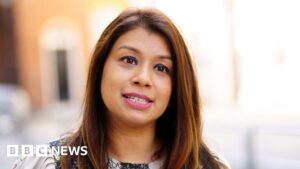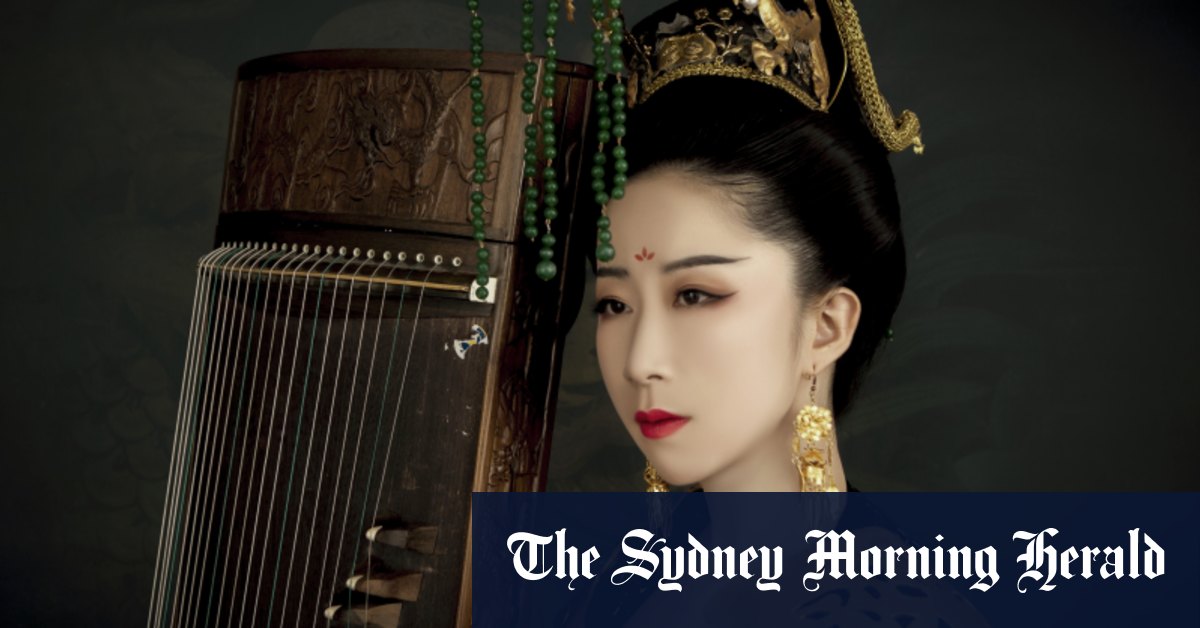
The first time Chinese-born composer Mindy Meng Wang visited Australia, she was disappointed. Having been told that Melbourne was the most European of its cities, she had pictured the south of France, or the canals of Venice. She got West Brunswick instead.
“I had this beautiful fantasy about Australia, and was really disappointed! It thought it was fun for a holiday but not a life. Maybe for retirement.”
She has now called Melbourne home for more than a decade and was named best musician at the 2021 Music Victoria Awards. She was also the first artist-in-residence at Melbourne Recital Centre to play a non-Western instrument. The guzheng, a harp-like instrument that is an imposing 1.63 metres long, is a difficult one to master.
“In China, a good player is a fully 100 per cent traditional player. I was good and I was really fast and was given special lessons by the best teachers. I was ahead of everyone around my age. But that came from eight hours’ practice every day of every school holiday, and huge pressure to get better and better both from family and teachers.”
Wang grew up in Lanzhou in China’s Gansu province. With the Gobi Desert to the north and mountainous Tibet to the south, the entire region was once crossed by the Silk Road, and today it remains a great cultural crossroads. Wang’s parents worked at a university created to encourage members of China’s 55 ethnic minorities to pursue higher education, and as a child she was surrounded by people from very different walks of life.
“China is really big, like Europe,” she says. “Once you get out of one area and go to another, it’s completely different, the traditions, sometimes the language and religions, everything. My city is a very mixed place.”
It wasn’t until she moved abroad that she realised some people don’t get along on account of their backgrounds or beliefs. At the night markets back home, a halal food stall will be centimetres from one roasting pork, but the vendors get along just fine. “They’re friends, they’ve been doing this for 50 years,” she says. “No one is offended because everybody understands that we’re all just people living in one place and we all have respect.”
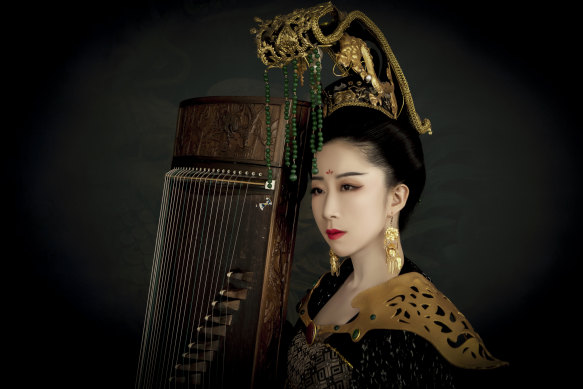
It wasn’t until Mindy Meng Wang left China that she realised that some people don’t get along because of their backgrounds.Credit: Panzi Studio
Wang’s own musical practice is just as embracing of difference, fusing age-old traditions and cutting-edge experimentation, ancient techniques and 21st century technologies. But it wasn’t until she was sent to study in the UK at 16 that she realised “music can be in so many different forms and there’s so much music I’d never heard of that was so beautiful”.
Loading
In London she started out playing traditional music with Silk String Quartet, the country’s leading exponent of the classical Chinese form. But opportunity came knocking in the form of Blur frontman Damon Albarn, who was looking for someone to play guzheng with his genre-leaping virtual band Gorillaz. Wang “realised it’s far more fun than playing in a traditional string quartet”.
Mastering an instrument can be torture, but unlearning it can be just as daunting.
“You put in 10 years of extremely disciplined hard work, becoming the best of the best, you’ve given so much and you have to let it go. It’s not easy. It took years. At the beginning, even though I was curious about new styles I was still very protective of my practice.”
Today you can catch Wang playing jazz festivals, electronic gigs, outdoor dance shows and contemporary classical concerts. This year will see new recordings with Paul Grabowsky plus collaborations with film composer David Hirschfelder (The Dressmaker, Strictly Ballroom) and Burkhard Dallwitz (The Truman Show).
Her next project is Opera for the Dead, an experimental performance exploring Chinese mourning rituals premiering at this year’s Asia TOPA festival in February.
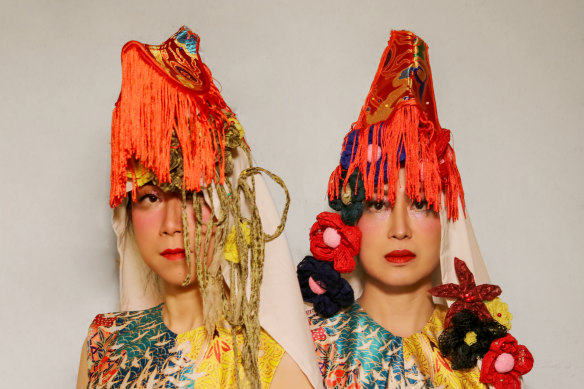
Mindy Meng Wang and Monica Lim explore Chinese mourning rituals in Opera for the Dead.Credit: Dewie Bukit
The guzheng has baked-in limitations. It’s tuned to the D major pentatonic scale, which means there are only five natural notes in each octave, and to change key you need to retune the whole instrument. “Think about how a lot of music actually changes key during a piece. That would be an impossible thing on a traditional guzheng. But my way of working is to realise those limitations and then figure something out to get around it.”
Take 7: The answers according to Mindy Meng Wang
- Worst habit? Over-commitment.
- Greatest fear? That humans will destroy the Earth and ourselves (already happening).
- The line that stayed with you? A line from Laozi’s Tao Te Ching. Its meaning is that the highest virtue resembles water. My interpretation: Laozi uses water as a metaphor for people with noble character, likening their qualities to water. First, it is soft and flexible. Second, it stays in humble, lowly places. Third, it nourishes all things without seeking conflict. There isn’t only one path to victory — possessing the strength of the “strong” while maintaining the humility of the “weak” is true wisdom.
- Biggest regret? Not understanding my father from an objective and perceptive perspective until after he passed away.
- Favourite book? Three Hundred Song Lyrics — a classic anthology of ci poetry from the Song Dynasty (960–1279). These lyrical poems were written to fixed musical tunes with set patterns of rhythm and rhyme. The collection showcases the elegance, emotional depth, and artistic refinement of Song ci, featuring works by some of the most renowned poets in Chinese literary history.
- Which artwork/song do you wish was yours? Birds in warped time II.
- If you could time travel, where would you go? Chang’an during the Tang Dynasty — or 60 years into the future to see where my daughter is.
Wang is constantly inventing new techniques and tuning systems to expand the guzheng’s capabilities. She also collaborates with a wide array of composers and musicians from across the sonic spectrum. “My curiosity about what I can do on this instrument has driven me to try different things. From experimental to electronic pop to Western classical to jazz, I want to see if this instrument can do this. If I can do this.”
She sums up her musical curiosity in a simple way: “If you have 10 flavours of ice-cream, why don’t you try all of them?”
In the three years before moving to Melbourne, Wang was looking after her ailing parents back in Lanzhou. Her father’s death in 2015 was almost like enlightenment, she says; she vicariously experienced something beyond the everyday. Something similar occurred a few years later, when her daughter Phoenix was born.
“Before I had a child, I was worried about how being an artist you really have to give 100 per cent of yourself. I felt like having a child would take a lot away. Then I talked to lots of successful women in the arts and they told me don’t worry, you don’t lose anything, you actually gain. And they were right. Having a child, I have a much deeper understanding of life and death.”
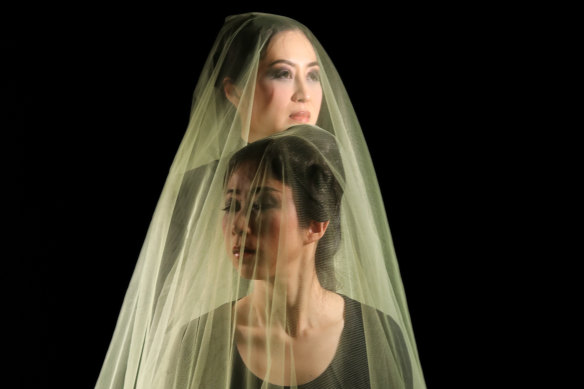
Mindy Meng Wang with Monica Lim in Opera for the Dead.
Opera for the Dead was inspired by Wang and co-creator Monica Lim’s fascination with Chinese rituals for the deceased. “Chinese funerals are such a weird thing,” Wang says. “When we think about funerals, it’s meant to be a very spiritual event, but in China it’s heavily linked to materialism, to what you offer to the passed.”
In some traditions a family may burn fake money or other paper objects to ease their relative’s afterlife. “Now you can burn iPhones, cars, Rolexes. In southern China they even have strippers to entertain the dead and the living.”
Wang says that while the project taps into the complex feelings she experienced after her father’s death, it isn’t a literal comment on grieving customs. “There will be a lot of cultural references, but in general it’s more about impressions, about feelings. It’s quite a theatrical experience and a very immersive experience.”
Opera for the Dead is at Space 28, University of Melbourne Southbank Campus, February 21-23. Asia TOPA runs from February 20 to March 10. asiatopa.com.au


